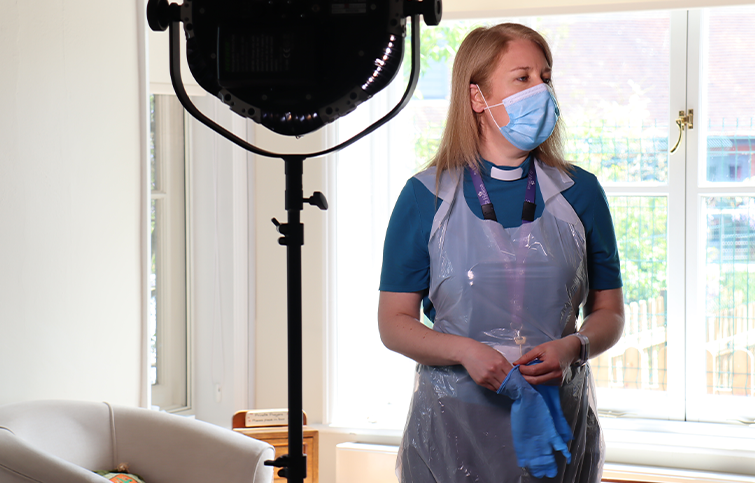Make a difference
People like you help us every day through regular donations
Read stories Donate The big part of chaplaincy is walking the journey with people. Pre-covid we’d often see people in the year before they actually really came to the end of life. Over that year we’d meet several times and go through all the ups and downs of the whole palliative journey with them. The real beauty of that is you’ve got time to build trust with people.
The big part of chaplaincy is walking the journey with people. Pre-covid we’d often see people in the year before they actually really came to the end of life. Over that year we’d meet several times and go through all the ups and downs of the whole palliative journey with them. The real beauty of that is you’ve got time to build trust with people.
Patients often start out saying ‘I don’t want to talk about death, I don’t want to talk about this’. After a few months they begin to feel comfortable to talk about those things; you can gradually address things as they come up, so by the time someone reaches end of life, they can die quite peacefully.
Now, when we’re not able to do that, people may be coming to the end of life who haven’t dealt with those things in the run up, and that can cause more issues for them at the end of life.
Since COVID we’re having a lot less face to face contact with patients because we need to protect them due to their physical vulnerability.
With patients in the community, wherever possible, we’re now talking to them by telephone and we hope to start talking to them by video link soon. We do go out for some home visits if there’s a need that can’t be met over the telephone, but it is very much when somebody is towards the end of their life or there is an emergency situation. That tends to be if we’re attending somebody for last prayers, or if they’ve got something going on that’s really distressing them and they actually just need that face to face conversation, someone to look them in the eye while they say something confidential.
We’re working with the chaplain at St Elizabeth Hospice and we take it in turns to produce a short 10 minute Sunday service for the patients on the ward and in the community, and it also goes out to our staff and volunteers. People who are missing being able to get to church can have that little ten minutes out of their day to have the church come to them.
We are still seeing patients on the inpatient unit but it’s a bit tricky, like it is for everyone working at The Hospice through masks and gloves and aprons. With the PPE on, we look like we’re nursing staff, so we need to help the patient to understand what our role is when it’s not so obvious.
I wear glasses and they often get steamed up, so trying to keep eye contact with people can be difficult. They can’t see your facial expressions through the mask either so it is a barrier. Some of the patients struggle to hear if they’ve got hearing difficulties and they can’t read your lips. It’s a challenge, but one we’re getting used to.
But you don’t quite get that same connection with people. To me, chaplaincy is about being present with people, it's about being able to hold their hand and look in their eye and to just be with them in what they're going through.
We often talk about some quite difficult subjects with people; trying to do that when you can’t see them and they can’t see you can be a barrier.
Chaplaincy has an important role because although we all know we’re going to die, it’s very different from knowing it’s starting to happen to your body. And when that starts to happen it does make us more aware of our souls.
Things that may have gone on through our whole life that we can shut to one side and ignore, tend to come up when we’ve got more time on our hands to think about it. Often people start looking back over their life story and that brings up, perhaps, regrets that they’ve had, or they start to assess how they’ve lived and changes they want to make.
It does bring up a whole load of stuff that people often ignore in day to day life, and to have somebody to actually listen to those experiences and have the skills to help work through what’s going on inside of them through that time, is invaluable to a lot of people.
My role here is to help people find peace in the journey and before they die, and I think that's probably more relevant now than ever; just helping people deal with anything they've got going on that is getting in the way of them finding peace. 
This story may not be published elsewhere without express permission from St Helena Hospice.

When you make a donation to St Helena Hospice, we are charged transactional fees by other companies, including fees for processing payments made to us, looking up addresses and validating bank account details.
We are very grateful to our donors who offer to offset some of these fees with a minor addition to their total amount. This is however completely optional and we are very grateful for your support whether or not you choose to contribute to processing fees.
CloseWe are able to claim an extra 25p on every £1 on your donation amount for no extra cost to you, as long as you are a UK tax payer; have paid enough income tax or capital gains tax in that tax year; and are donating your own money. For more information about Gift Aid, please visit www.gov.uk
Close